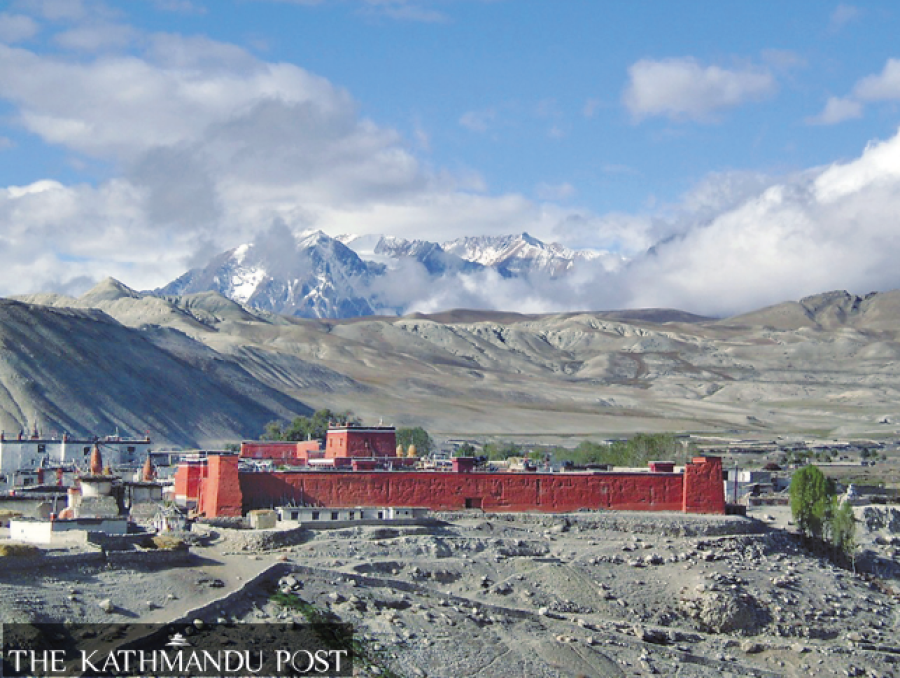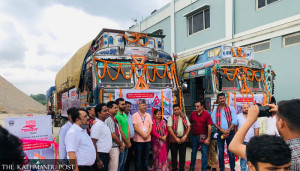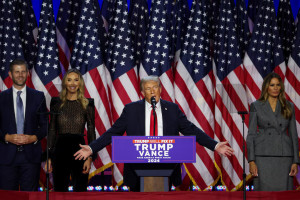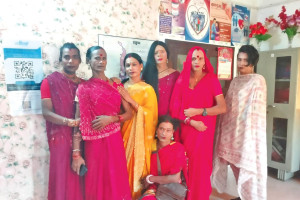Gandaki Province
No time for elections in upper Mustang
With most villages empty as the local population has migrated to warmer climes, authorities should have rethought poll timing, villagers say.
Lal Prasad Sharma
Tsering Gurung left his village in upper Mustang for Syangja a month ago. He makes this journey every year when the winter sets in. The next four months are crucial for Tsering who sells winter clothes on the streets of Syangja. The 32-year-old is currently in a fix, he says, and has been debating with himself for the past few days whether to return to his village to cast his vote in the upcoming general and provincial elections.
“This is the only time I can expect to do maximum business selling winter clothes. I will lose the only opportunity to make money this year if I leave now,” said Tsering, a resident of Samjung village in Lomanthang Rural Municipality Ward No 2. “I want to cast my vote but I will lose time if I go home now. I get customers only till February. No one will buy winter clothes after that.”
Like Tsering, his brother, sister and sister-in-law have left for Pokhara to earn some money by selling knick-knacks in the city. “We have five registered voters in the family. My mother and my wife are at home but they may not go to cast their votes as it’s getting colder by the day in the village,” said Tsering.
Most residents of high-altitude villages in the Gandaki province leave home around October every year to avoid the biting cold in the mountains and to simultaneously earn some money through small business ventures such as selling clothes, herbs from the mountains, and household and daily essential items in the lower-altitude cities until the weather turns and they can return home.
Yangzin Gurung of Chosher village in Ward No 1 of the rural municipality is currently in Chitwan in Bagmati province selling daily household goods and mountain herbs. She left for Chitwan on October 18. The 36-year-old says she will not be going home to cast her vote as she feels that the political parties and leaders are out-of-touch with reality.
“Life in the mountains is hard. We have to hustle to keep our family warm and fed. This is not the first time an election is being held. Nothing has changed for us,” said Yangjin. “However, if we are important to the political leaders and if our votes can change the country’s political landscape, they should have considered the mountain population before deciding to hold an ‘important’ election in winter, when most of us migrate to warmer places.”
Yangzin is in a rush to make some money before she leaves for her village in February. “If I don’t hustle for the next three to four months here in Chitwan, I will not have any money to take home and we will have to struggle to make ends meet for the rest of the year,” she said. “The authorities should have held the elections in March when the locals of the mountainous villages start returning.”
With the winter setting in, temperature has been dipping steadily in the mountain villages like Ghami, Charang, Lomanthang, Chosher, Chonhup and Muktinath in upper Mustang. The villages have descended to warmer climes to cities in Tarai, Kathmandu, Pokhara and some to India. More than 500 Mustang locals have gone to India for employment just like in the previous winter seasons, according to a local teacher Tamding Gurung.
There are only one or two people in a house currently, says Tashi Narbu Gurung, chairman of Lomanthang Rural Municipality. “About 75 percent of the local population is not in the villages. Only the elderly, children and shepherds have stayed back,” said Tashi. “It is customary for people to leave the villages once the winter sets in. They go elsewhere looking for opportunities to earn some money. The harsh winter days do not allow for any businesses or agricultural activities in the mountainous region.”
Tashi says for maximum voter participation the authorities should have deliberated on the election’s timing. “Like most people here, I also think the schedule of the election has robbed the local population of their voting rights. The locals leave the villages for four months every year and the villages become empty. This is the time for the locals to earn money by doing itinerant trade, menial labour, etc, in other parts of the country. The government should have thought this through before deciding the election date,” said Tashi.
There are five rural municipalities in upper Mustang with 1,533 voters in Lo‑Ghekar Damodarkunda Rural Municipality, 2,285 in Varagung Muktichhetra Rural Municipality, 2,817 in Thasang Rural Municipality, 2,314 in Gharapjhong Rural Municipality and 2008 voters in Lomanthang Rural Municipality, according to Samir Thapa, information officer of Mustang Election Office.
But in Lomanthang, hardly 800 votes will be cast, says Tashi.
In Lo-Ghekar Damodar Kunda Rural Municipality, voter participation will be lower than 40 percent, says Tsering Lhamo Gurung, deputy chairman of the rural municipality. “The villages are empty. If I didn't have official responsibilities, I would also have left. The scheduled election date is unsuitable for the mountain population,” he said.
Locals believe that as the mountain region is sparsely populated, voter participation is not a priority of either the political leadership or the government.
The majority of villages in Varagung Muktichhetra Rural Municipality are empty too, according to said Rinzin Namgyal Gurung, chairman of the rural municipality. “Some candidates are going door to door to ask for votes but there is no one to answer the door in most houses,” said Rinzin. “Prem Prasad Tulachan, a candidate in the upcoming polls, visited the empty villages, got disappointed and left.”
Tulachan is the CPN-UML candidate in Mustang for the House of Representatives. After canvassing in empty villages, he says that the mountain populations have been deprived of their right to vote this time.
“We can ask the villagers to return home to cast their votes but it is a difficult ask. Their livelihood depends on the money they make in these four months,” said Tulachan. “It is disheartening to see that they cannot exercise their franchise.”
Similarly, Bikal Sherchan, Congress candidate for the provincial assembly (2), said that the disregard for voter participation of the mountain population in important elections is indicative of the government’s attitude to what they deem an insignificant vote bank.
“Many are being deprived of their right to vote because of the government’s negligence towards the mountain people. The Election Commission should have thought this through. If they couldn’t find an election date suitable for everybody, they should have at least made arrangements for the local people of the mountain villages to return home to exercise their franchise,” said Bikal. “There is no point in holding an election where people can’t vote.”
According to Tamding, the local teacher in Chosher, Ward No 1 of Lomanthang Rural Municipality, even the schools have moved base from upper Mustang for the winter months. “All the schools in upper Mustang villages have been shifted to Pokhara. We do this every year. As most students and teachers go to Pokhara during winter, schools run mobile classes and home tutoring to avoid disrupting the academic session,” said Tamding who teaches at Divyadip Secondary School. “Most will not return to the villages to cast their votes by jeopardising the students’ academic performance. Winter in the mountain areas is difficult physically, emotionally and most importantly, financially. Conducting elections in this season is pointless but the government remains unbothered.”
According to Thapa, the information officer of the Election Office in Mustang, there are 10,957 registered voters in Mustang. “While conducting a voter education event on Sunday, there were only a bunch of people attending in Lomanthang and Lo-Ghekar Damodar Kunda rural municipalities,” he said. “There are a total 34 voters in Ward No 5 of Varagung Muktichhetra Rural Municipality. This village is 40 km from the headquarters Jomsom and 33 km from the ward office. By November third week, it may start snowing so we may not receive a single vote.”
Deputy Superintendent of Police in Mustang, Rabindranath Paudel, said most voters have complained about the election schedule stating that the government has failed to take their voting rights into consideration.
According to Netra Prasad Sharma, the chief district officer, in case of snowfall, more than 17 polling stations including seven in Lomanthang, nine in Lo-Ghekar Damodarkunda, and one in Varagung Muktichhetra will be deeply affected. “It will be next to impossible to bring voters to polling booths if it snows,” he said.
Agyal Gurung, a local of Chonhup in Lomanthang Ward No 3, said, “The locals of upper Mustang start leaving their houses by mid-September to sit out the winter and to earn some money while they are gone,” said Agyal. “It is difficult for most people to return to the villages to cast their votes. The narrow foot trails are risky. Even if they do come, what will they do after the elections? There is no work or food in the villages,” said Agyal, who is among the few who have stayed back in the village this winter.




 16.12°C Kathmandu
16.12°C Kathmandu.jpg)














